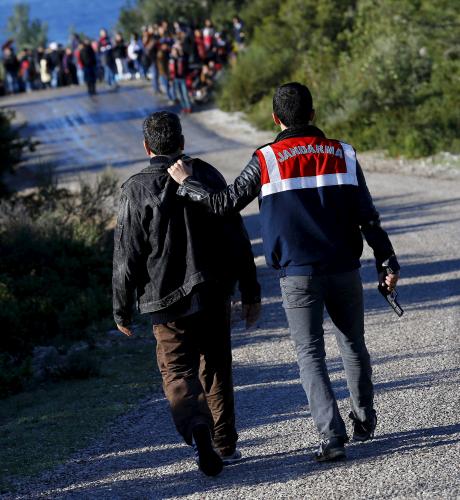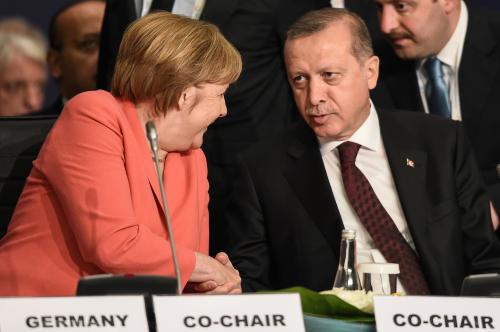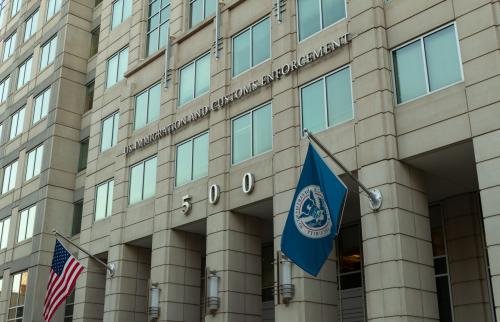Ahead of the U.N. secretary general’s High Level Summit on Refugees and Migrants (Monday) and President Obama’s Leaders’ Summit on the Global Refugees Crisis (Tuesday), something tragic is happening on the Turkey-Syria border: a 40-truck humanitarian aid convoy is stuck. The trucks are awaiting clearance from warring factions in Syria to proceed to besieged areas, especially in East Aleppo.
This is yet another reminder of Turkey’s continued importance in helping to address the humanitarian consequences of the chaos in Syria. Turkey now hosts almost three million Syrian refugees, more than half of the refugee population in the region. It has spent $12 billion assisting them—for context, the U.N has spent a little over $14 billion assisting displaced people inside Syria and throughout the region, so Turkey alone has spent nearly as much money on the refugee crisis as the international community as a whole. Turkish leaders have also been loud proponents for greater international burden sharing, and hosted the first World Humanitarian Summit in Istanbul in May.
But a brief survey of Turkish media and relevant government websites—on top of conversations with Turkish experts—reveals Turkey’s absence from the preparations of the two upcoming summits. Why is that, and what could Turkey be doing?
A downturn
The coup attempt in July has provoked considerable instability in the country, and detentions and dismissals of large numbers of government employees is hindering efforts to help refugees. It was with open arms that Turkey began to receive Syrian refugees in 2011, and the country put into place a temporary protection regime that earned the international community’s praise.
But as the crisis in Syria persisted and the number of refugees grew, it became impractical to house them all in camps. Ever-larger numbers are finding themselves living in difficult urban environments where it is harder to provide livelihood services. Earlier this year, Turkey made the bold move to open its labor market to Syrian refugees—however, in the first six months, only 5,500 work permits have been granted (for context, a Turkish think tank calculated that at least 750,000 Syrian refugees in Turkey would be employable). Refugees are increasingly resorting to negative coping mechanisms involving illegal work under exploitative circumstances, as well as sending children to work and forcing underage girls into marriage.
These realities are complicating the education scene, too. In spite of government promises to improve the situation, more than half of the almost one million school-aged Syrian refugee children are out of school. Education quality is a concern, as well, especially outside refugee camps, and another 360,000 children under 5 are waiting in the wings for school.
Turkey has long complained, rightly, that the international community hasn’t been very forthcoming with burden-sharing through refugee resettlement. Now, as resettlement programs around the world are finally picking up, educated refugees are actually confronting barriers to leaving Turkey. There are stories that Turkish officials are making it difficult, in part because of news that many well-educated and professional Syrians already fled to Europe in 2015, as well as the mistaken conviction that Western countries are cherry-picking refugees for their resettlement programs.
And finally there is the controversial EU-Turkey deal from March. The deal had promised to Turkey that in return for preventing Syrian refugees from falling into the hands of unscrupulous smugglers and risking death attempting to cross the Aegean Sea, a system for resettling refugees outside Turkey would be established (and Turkey would receive around $6 billion to support building the resilience of Syrian refugees and the communities hosting them). But these aspects of the deal have received less attention in Turkey than the promise to extend visa liberalization for Turkish nationals; many now fear that the deal is on the verge of collapse, as the number of Syrians attempting to cross into Greece appears to be picking up again.
Turkey’s chance
These developments aren’t in line with the high ground that Turkey once claimed on the refugee situation. This is especially disappointing because the two summits next week—in addition to the London Conference on Supporting Syria and the Region (this past February) the High Level Meeting on Global Responsibility Sharing through Pathways for Admission of Syrian Refugees (this past March)—are at least partly in response to Turkey’s calls for greater solidarity and burden-sharing. These are U.S. and international efforts to address the challenges resulting from the Syrian humanitarian crisis and displacement, albeit belatedly.
The coup attempt in Turkey has indeed been a traumatic experience, and it is understandable that it would have distracted Turkey’s attention from the upcoming summits. However, as the Turkish president attends the U.N. General Assembly next week, it would be an important, constructive step for him to acknowledge international efforts (and could help make up for some of the previous harsh and, at times, contemptuous language he’s used against the West for its inadequate support). It could also be an occasion to signal that in the aftermath of these summits, Turkey will revitalize its open-door policy and work with the international community to increase refugees’ resilience, particularly through access to education and the labor market.
Furthermore, the Turkish president should reassure his audience that Turkey isn’t using the de facto safe haven created in northern Syria since its military intervention to prevent Syrians from reaching Turkey. Lastly, in spite of the West’s overall failure to empathize with Turkey for the trauma it experienced in July, Turkey should recommit itself to the EU-Turkey deal. It is important to remember that the primary purpose of the deal is to improve Syrian refugees’ lot. Recommitting to the deal would surely shore up other aspects of the deal that are dear to Turkey, and also contribute in key ways to the objectives of the two summits in New York next week.
There’s a Turkish expression that essentially says: “When you’re in a vineyard, you should enjoy eating the grapes, rather than beating the vineyard keeper.” Turkey should do what it’s in New York to do: help find solutions to the Syrian refugee crisis, not continue to beat up on the West, as tempting as that may be.
Sema Karaca, a graduate student at Istanbul University and a researcher at the Migration and Refugee Studies Association (IGAM), provided research for this post.
The Brookings Institution is committed to quality, independence, and impact.
We are supported by a diverse array of funders. In line with our values and policies, each Brookings publication represents the sole views of its author(s).









Commentary
Why doesn’t Turkey have a more prominent role in next week’s U.N. refugees summit?
September 16, 2016